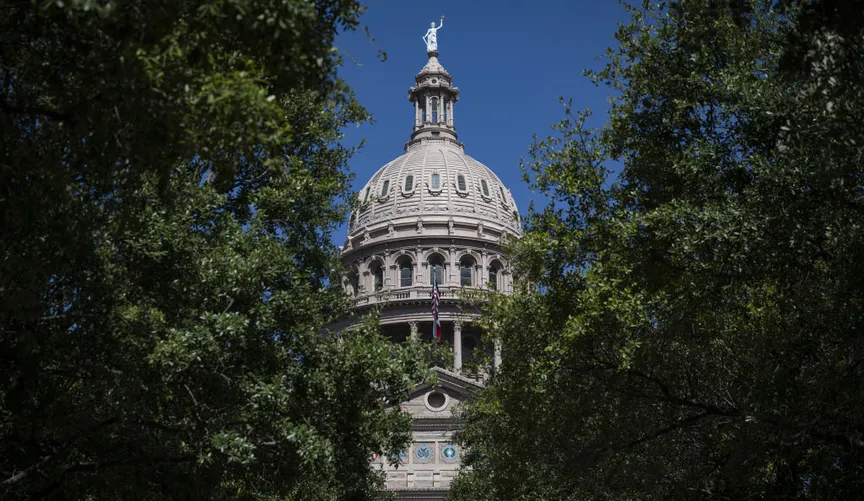
This analysis and news roundup comes from the Canary Media Weekly newsletter. Sign up to get it every Friday.
Over the past few months, the Texas Senate passed three bills that could’ve devastated the state’s nation-leading renewable energy rollout — but clean energy has dodged the bullet.
The first of those bills would have established new fees, setback requirements, and other permitting regulations on utility-scale wind and solar development, even though fossil-fuel plants don’t face the same restrictions. The second would have required large renewables installations to buy gas generation as a backup.
And the third would’ve ensured all renewable power development came with a side of fossil fuels, as it directed that 50% of all new power plant capacity added to the state’s grid come from dispatchable resources other than battery storage. That would have amounted to a gas mandate: Since solar panels and wind turbines can only produce power under certain conditions (sun shining, wind blowing, you know the drill), they can only be dispatchable power sources if batteries are involved. An earlier version of the bill explicitly said 50% of new capacity would have to come from gas.
These bills would have seriously slowed Texas’ deployment of solar, batteries, and wind power, which are shattering power-generation records in the state and helping its grid withstand extreme weather and meet surging electricity demand. The legislation would have caused reliability to fall and utility bills to soar, according to an April report from Aurora Energy Research.
But the Texas House’s session is set to end on June 2, and none of those three bills have been scheduled for consideration. This doesn’t necessarily mean they won’t resurface at some point, but they’re at least dead as standalone bills for this session, Doug Lewin writes in his Texas Energy and Power newsletter.
There are growing signs that these sorts of restrictions on renewables aren’t popular among many Texas Republicans and business interests. Recent polling from Conservative Texans for Energy Innovation shows widespread Republican support for renewables, while even the Texas Oil and Gas Association allied with renewable power generators to oppose the state House’s companion to the Senate’s bill requiring gas backup for clean energy.
Similar efforts in the state were defeated two years ago as well.
DOE orders a coal plant to stay open
The Trump administration took its pro-coal agenda to a new level last Friday, ordering a retiring Michigan coal plant to stay open through at least the end of August. The J.H. Campbell plant was supposed to shut down tomorrow, and Michigan utility Consumers Energy had been working since at least 2021 to do so. But the administration contended that the Midwest faces an “energy emergency” and needs the plant to guarantee power reliability.
Clean energy advocates, consumer watchdogs, and even Michigan’s top energy regulator disagree. “We currently produce more energy in Michigan than needed,” Michigan Public Service Commission Chair Dan Scripps said in a statement. “The unnecessary recent order from the U.S. Department of Energy will increase the cost of power for homes and businesses across the Midwest.”
Trump’s nuclear orders probably won’t outweigh cuts
President Donald Trump signed a series of executive orders late last week to boost nuclear power — though they probably won’t counteract his many moves to weaken the industry. The four orders will:
But in recent months, the Trump administration has also looked to reduce funding for the Energy Department’s Office of Nuclear Energy, and cut staff at the Loan Programs Office, even though it funds nuclear reactor projects. And though nuclear made out better than other low-carbon energy sources in the federal budget bill recently passed by the House, projects would only be eligible for tax credits if they start construction by 2028 — an ambitious timeline for a famously slow-to-build energy source. Those are big setbacks that won’t “magically be solved” by simply cutting red tape, Josh Freed, who heads the climate and energy program at that think tank Third Way, told Latitude Media.
DOGE days over? Elon Musk announces he’ll leave the Trump administration as Tesla investors demand he return to the company, then condemns the U.S. House’s proposed end to clean energy tax credits. (Associated Press, Financial Times, Politico)
A blow to industrial decarbonization: The U.S. Energy Department announces the termination of $3.7 billion in grants from the Office of Clean Energy Demonstrations, which funds carbon capture and other ambitious but unproven projects to help cut industrial emissions. (news release)
Solar loses its farm: A U.S. Agriculture Department report says solar development on productive farmland poses a “considerable barrier” to agricultural expansion, and the department says it will reshape federal loans to disincentivize solar on farmland. (Heatmap)
I’ll drive what she’s driving: A nonprofit’s nationwide campaign aims to get more women into electric vehicles, including by turning suburban moms into EV ambassadors who can talk about benefits, like lower operating costs than gas cars and added storage space with “frunks.” (Canary Media)
Recycling reduction: The collapse and bankruptcy of EV battery recycling startup Li-Cycle underscores the battery recycling industry’s challenges, especially as federal support dwindles. (Canary Media)
Things that make no sense: The U.S. EPA has reportedly drafted a plan to eliminate all greenhouse gas emissions limits on coal and gas power plants, stating in its proposed rule that the facilities“do not contribute significantly to dangerous pollution” or climate change. (New York Times)
Another threat to batteries: Executives overseeing battery component production at an LG Energy Solution plant in western Michigan say the combination of high tariffs and restricted federal subsidies would devastate the domestic market that’s attempting to compete with China. (New York Times)
Cities step up on climate: Cleveland’s work around reducing building emissions and installing EV chargers in underserved neighborhoods shows how U.S. mayors are taking climate action, with or without the help of the federal government. (Grist)
A clarification was made on June 2, 2025: This story has been updated to reflect that Texas bills targeting renewable energy have not passed.